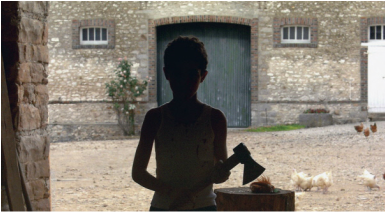
Once Georges begins to put the pieces together, Haneke's minimalist script deliberately parcels out information. A key anecdote between Georges and Majid is withheld, but not because of contrivance or the cheap accumulation of tension. Instead, both characters know what happened, and feel no need to explicate it. This naturalism makes the eventual reveal completely earned, as the shame of it keeps the incident buried deep inside Georges. His eventual telling of the story to his wife demonstrates what a talented actress Binoche is, as waves of fear and betrayal and disgust wash over her face. The story itself, teased by one of Haneke's trademark nightmare sequences, was perpetrated by a very young Georges, but the ramifications of it have reverberated for decades, steering his life in one direction and Majid's in another. That child Georges can have the impact he does, and maintain the lifestyle he does as an adult, demonstrates the different set of stakes the two boys lived under. Accidents of birth made one's life comfortable and the other's tenuous, with the added force of colonialism putting fingers on scales. Haneke never engages in speechifiying or blatant thematic statements, but his message comes out clearly.
The voyeuristic aspect of Cache fits well with Haneke's camera work. There is no distinction between his camera and the camera of whoever is taking these surveillance videos. No grain appears in the frame to distinguish the two, and there's no Record symbol or color shift to signify which is which. Therefore, any long shot could be the way Haneke chose to film a scene, or within the film, it could be the stalker watching the central family. In fact, both are often true. An early sequence of Pierrot leaving school both establishes his daily routine and his camaraderie with his friends, but it also shows that the stalker is watching him. In a clever meta turnabout, the viewer becomes the stalker. Later scenes of intimate, intense conversations add to this feeling, as what's being discussed is so private that the viewer feels like an intruder. Additionally, Haneke uses the film-within-a-film gimmick to add more information to scenes that have already happened. Haneke's camera leaves a scene between Georges and Majid once Georges leaves Majid's apartment, but the stalker's camera stays inside, later revealing Majid's private reaction. This technique adds depth to every scene and every frame, making the viewer question the perspective of what they're seeing.
Riveting and arresting, Cache is an excellent examination of unquestioned privilege and far-reaching sin. Haneke again impresses with his small-scale storytelling and large-scale ideas. A repeated line in the film stresses the innate need to protect what you have. Cache acknowledges that need while asking the viewer to wonder how they got it. As one cannot reign innocently, neither can one accumulate innocently. A-
 RSS Feed
RSS Feed